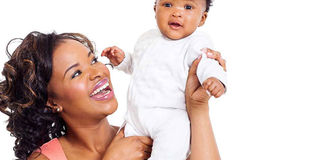Kenyan innovators get grants to tackle health issues

Dahabo is one of five Kenyans, among eight Africans innovators that will receive $100,000 (Sh1 million) grants to tackle maternal, neonatal and child health challenges. PHOTO| FILE| NATION MEDIA GROUP
Most pregnant women may not need to wear a necklace or bracelet with GPS-tracking to remind them to attend the recommended four ante-natal clinics. A good number of them do so without a problem.
However, among nomadic and pastoralist communities, women barely make it for ante-natal clinics, because they are always moving, in the search for greener pastures.
Enter Dahabo Adi Galgallo, a community worker in Marsabit County, who is developing a coin-sized solar-powered GPS-tracking device that will be fitted into cultural bracelets of expectant mothers in nomadic communities, to help health workers locate them easily and provide them with pre- and antenatal care where they are.
NEPAD GRANTS
Dahabo is one of five Kenyans, among eight Africans innovators that will receive $100,000 (Sh1 million) grants to tackle maternal, neonatal and child health challenges, on a continent that accounts for more than half of global maternal deaths and more than three-quarters of neonatal deaths.
They are beneficiaries of the African Academy of Sciences and the NEPAD Agency’s Alliance for Accelerating Excellence in Science in Africa (AESA), which through the Grand Challenges Africa, in partnership with the Bill and Melinda Gates Foundation and Institut Pasteur of Paris, is funding innovations that will help Africa achieve the Sustainable Development Goals.
They were selected from a pool of 400 applicants from 20 African countries.
The other Kenyan researchers include Jesse Gitaka, a lecturer at Mount Kenya University, who is developing a point of care diagnostic for bacterial infections that have been implicated in poor pregnancy outcomes; Angela Koech Etyang, a physician scientist, from the Aga Khan University in Nairobi, for a project to make basic screening tests available to pregnant women at dispensaries and health centres that do not have laboratory facilities for conditions such as HIV, syphilis and anaemia.
The others are Eric Ogola, an epidemiologist, and PhD student, who is developing an easier way to decide which antibiotic to use in blood-borne infections in children less than one month old to reduce deaths in children; while Christine Musyimi of the Africa Mental Health Foundation has a project to engage traditional birth attendants to reduce maternal depression in rural areas.
The other three researchers who received funding are from Madagascar and Senegal.
They include Niaina Rakotosamimanana who is developing a low-cost and minimally invasive diagnostic test for pregnant women using dried blood samples drawn from finger pricks; Diawo Diallo from Senegal, who is working on a surveillance system to track Zika-infested mosquitoes, and his compatriot Muriel Vray, an epidemiologist, who is working on a simple, inexpensive assay to determine hepatitis B levels.
The innovators are the first in a round of seed grants that will help them work on their projects, for two years, to solve health problems.


